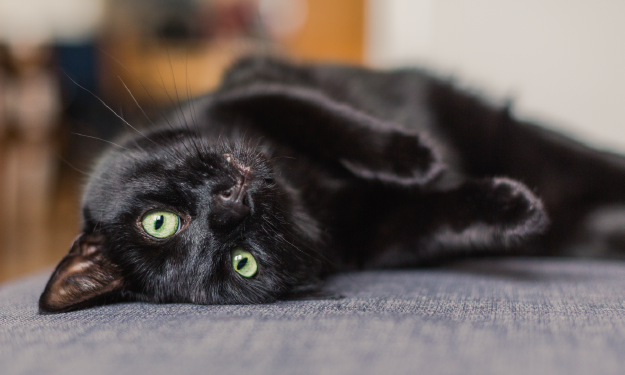Where Did Black Cats Get Their Bad Reputation?

I’ve never been one for superstitions. I step on cracks in the sidewalk, I walk under ladders without a thought, and as a child I had a black cat.
Others, however, are not so trusting.
Somewhere down the line, black cats became a Halloween-favorite and a symbol of bad luck. Many people still believe that a black cat crossing your path is an omen of misfortune and even death! But how exactly did these cute kitties get stuck with this black cat superstition?
Fear of Cats: Stemming from Prehistoric Ages
If you think about it, it’s really no surprise that mankind tends to distrust our feline friends. In the earliest days of history, cats were large, carnivorous creatures that evidence suggests humans often had to fend off in order to survive. Just imagine living amongst the Sabretooth Tiger!
Unlike our wolf friends, humans did not attempt to domesticate these dangerous creatures until much later. Cats were domesticated at least 5,000 years after dogs! Our fear is what kept us alive and away from felines.
Greek Mythology
One theory claims that black cats’ bad rap began in Greek mythology. When Hera (Zeus’ wife) transformed her servant Galinthias into a black cat out of anger, Galinthias then went on to serve the goddess of magic and spells, Hecate. And there you have it – the black cat became the witch’s sidekick!
Dark Ages Spark Black Cat Fears
Fast-forward thousands of years to the Middle Ages in Europe, and black cats still couldn’t catch a break. A folklore spread about a man and his son who came across a black cat, which they began to toss rocks at. The injured cat ran into a woman’s house who was suspected of being a witch. When the woman happened to appear limping and bruised the next day, people suspected that the cat must be the woman in disguise.
Seems reasonable.
Other theories suggest that during this time, people started to see black cats as a sign of death and bad luck simply because of their black fur, just like ravens and crows. Sadly, mass killings of black cats spread across Europe as people tried to rid the streets of these bad omens, especially during the Great Plague.
Witches & Black Cats
This disturbing practice carried over into the prosecution of witches across Europe and eventually to the Salem Witch Trials. Black cats whose owners were accused of witchcraft were associated with the Devil and evil. People thought black cats assisted witches in their evil deeds. They also believed that witches could transform into black cats to lurk in the shadows and cast spells on people. Both witches and black cats were persecuted and killed together.
Pretty morbid, huh?
But Not Everyone Hated Black Cats
That being said, there were plenty of black cat-lovers throughout history, too! Ancient Egyptians viewed black cats as divine and believed that gods lived within them. In certain parts of 19th century Europe, black cat sightings were actually considered good omens. The Irish believed that a black cat on your porch was good luck, and in Japan black cats are similarly revered as symbols of prosperity.
Luckily for our feline friends, these bad superstitions have virtually vanished. Black cats are now a part of many families across the world! However, many black cats are still mistreated and feared today, especially around Halloween. This is why we always caution owners of black cats to keep them safely indoors around that time of year.
As someone who owned and loved a black cat, I can assure you, there is no evil associated with the color of their fur. Yes, there was the occasional bite or scratch and, yes, he often brought home mice home as “presents”. But any cat owner will tell you: that’s a cat thing, not an evil thing.
Written by Elizabeth Pezzoni